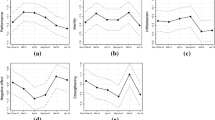Abstract
This chapter examines Dutch public opinion toward the European Union (EU) in a longitudinal perspective. From being a traditional core pro-European country, the Netherlands has recently experienced widespread euroscepticism that has become mainstream. The European Parliament (EP) 2014 elections witnessed this evolution. Yet, Dutch euroscepticism has previously been shown to consist of multiple dimensions. In this chapter, we revisit the dimensional structure of EU attitudes in the aftermath of the Eurozone Crisis. Using four-wave panel survey data from the Netherlands (2013–14), we show that indeed at the aggregate level there is stability in Dutch public opinion. The five-dimensional structure of EU attitudes still holds, while the increased importance of EU attitudes for voting behavior in EP elections is also highlighted.
Access this chapter
Tax calculation will be finalised at checkout
Purchases are for personal use only
Similar content being viewed by others
Notes
- 1.
Source: website of the European Parliament http://www.europarl.europa.eu/elections2014-results/ l
- 2.
Fieldwork dates were December 13–26, 2013, for the first wave, March 20–30, 2014, for the second wave, April 17–28, 2014, for the third wave, and May 26–June 2, 2014, for the fourth wave.
- 3.
In particular, this involved the negative affections dimension, as strong negative affections indicate unfavorable attitudes toward the EU. For the ease of interpretation, we reversed this scale.
- 4.
Complete CFA results are available on request.
References
Aarts, K., & Van der Kolk, H. (2006). Understanding the Dutch “No”: The Euro, the East, and the Elite. PS: Political Science and Politics, 39(2), 243–246.
Armingeon, K., & Guthmann, K. (2014). Democracy in crisis? The declining support for national democracy in European countries, 2007–2011. European Journal of Political Research, 53(3), 423–442.
Boomgaarden, H. G., Schuck, A. R. T., Elenbaas, M., & De Vreese, C. H. (2011). Mapping EU attitudes: Conceptual and empirical dimensions of Euroscepticismand EU support. European Union Politics, 12(2), 241–266.
De Vreese, C. H., Banducci, S. A., Semetko, H. A., & Boomgaarden, H. G. (2006). The news coverage of the 2004 European parliamentary election campaign in 25 countries. European Union Politics, 7(4), 477–504.
De Vreese, C. H., & Boomgaarden, H. G. (2005). Projecting EU referendums fear of immigration and support for European integration. European Union Politics, 6(1), 59–82.
De Vries, C. E. (2007). Sleeping giant: Fact or fairytale? How European integration affects national elections. European Union Politics, 8(3), 363–385.
Easton, D. (1975). A re-assessment of the concept of political support. British Journal of Political Science, 5(4), 435–457.
Eijk, C.v. d., & Franklin, M. N. (2004). Potential for contestation on European matters at national elections in Europe. In G. Marks & M. R. Steenbergen (Eds.), European integration and political conflict (pp. 32–50). Cambridge: Cambridge University Press.
Hobolt, S. B. (2014). Ever closer or ever wider? Public attitudes towards further enlargement and integration in the European Union. Journal of European Public Policy, 21(5), 664–680.
Hobolt, S. B., & Brouard, S. (2010). Contesting the European Union? Why the Dutch and the French rejected the European constitution. Political Research Quarterly, 64(2), 309–322.
Hooghe, L., & Marks, G. (2005). Calculation, community and cues public opinion on European integration. European Union Politics, 6(4), 419–443.
Lindberg, L. N., & Scheingold, S. A. (1970). Europe’s would-be polity: Patterns of change in the European Community. Englewood Cliffs, NJ: Prentice Hall.
Lubbers, M., & Jaspers, E. (2011). A longitudinal study of Euroscepticismin the Netherlands: 2008 versus 1990. European Union Politics, 12(1), 21–40.
Reif, K., & Schmitt, H. (1980). Nine second-order national elections. A conceptual framework for the analysis of European election results. European Journal for Political Research, 8, 3–44.
Schuck, A. R. T., & De Vreese, C. H. (2009). Reversed mobilization in referendum campaigns how positive news framing can mobilize the skeptics. The International Journal of Press/Politics, 14(1), 40–66.
Van Spanje, J., & De Vreese, C. H. (2014). Europhile media and eurosceptic voting: Effects of news media coverage on eurosceptic voting in the 2009 European parliamentary elections. Political Communication, 31(2), 325–354.
Van Spanje, J. H. P., & De Vreese, C. H. (2011). So what’s wrong with the EU? Motivations underlying the eurosceptic vote in the 2009 European elections. European Union Politics, 12(3), 405–429.
Author information
Authors and Affiliations
Editor information
Editors and Affiliations
appendix
appendix
Copyright information
© 2017 The Author(s)
About this chapter
Cite this chapter
de Vreese, C., Azrout, R., Moeller, J. (2017). Netherlands 2014 EP Voting Patterns: From Euphile to Eurosceptic. In: Hassing Nielsen, J., Franklin, M. (eds) The Eurosceptic 2014 European Parliament Elections. Palgrave Studies in European Union Politics. Palgrave Macmillan, London. https://doi.org/10.1057/978-1-137-58696-4_8
Download citation
DOI: https://doi.org/10.1057/978-1-137-58696-4_8
Published:
Publisher Name: Palgrave Macmillan, London
Print ISBN: 978-1-137-58695-7
Online ISBN: 978-1-137-58696-4
eBook Packages: Political Science and International StudiesPolitical Science and International Studies (R0)




